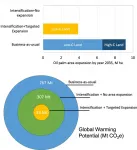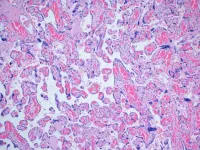(Press-News.org) For college students under pressure, a dog may be the best stress fighter around.
Programs exclusively focused on petting therapy dogs improved stressed-out students' thinking and planning skills more effectively than programs that included traditional stress-management information, according to new Washington State University research.
The study was published today in the journal AERA Open, a peer-reviewed journal of the American Educational Research Association. The paper demonstrated that stressed students still exhibited these cognitive skills improvements up to six weeks after completion of the four-week-long program.
"It's a really powerful finding," said Patricia Pendry, associate professor in WSU's Department of Human Development. "Universities are doing a lot of great work trying to help students succeed academically, especially those who may be at risk due to a history of mental health issues or academic and learning issues. This study shows that traditional stress management approaches aren't as effective for this population compared with programs that focus on providing opportunities to interact with therapy dogs."
The researchers measured executive functioning in the 309 students involved in the study. Executive function is a term for the skills one needs to plan, organize, motivate, concentrate, memorize: "all the big cognitive skills that are needed to succeed in college," Pendry said.
Pendry conducted this study as a follow up to previous work, which found that petting animals for just 10 minutes had physiological impacts, reducing students' stress in the short-term.
In the three-year study, students were randomly assigned to one of three academic stress-management programs featuring varying combinations of human-animal interaction and evidenced-based academic stress management. The dogs and volunteer handlers were provided through Palouse Paws, a local affiliate of Pet Partners, a national organization with over 10,000 therapy teams.
"The results were very strong," Pendry said. "We saw that students who were most at risk ended up having most improvements in executive functioning in the human-animal interaction condition. These results remained when we followed up six weeks later."
Many universities, including WSU, have provided academic stress management programs and workshops for many years. These are traditionally very similar to college classes, where students listen to an expert, watch slideshows and take notes. They're often evidence-based courses that talk about ways to get more sleep, set goals, or manage stress or anxiety.
"These are really important topics, and these workshops are helping typical students succeed by teaching them how to manage stress," Pendry said. "Interestingly though, our findings suggest that these types of educational workshops are less effective for students that are struggling. It seems that students may experience these programs as another lecture, which is exactly what causes the students to feel stressed."
Human-animal interaction programs help by letting struggling students relax as they talk and think about their stressors. Through petting animals, they are more likely to relax and cope with these stressors rather than become overwhelmed. This enhances students' ability to think, set goals, get motivated, concentrate and remember what they are learning, Pendry said.
"If you're stressed, you can't think or take up information; learning about stress is stressful!" she said.
Animal sessions aren't just about changing behavior; they help students engage in positive thoughts and actions.
"You can't learn math just by being chill," Pendry said. "But when you are looking at the ability to study, engage, concentrate and take a test, then having the animal aspect is very powerful. Being calm is helpful for learning especially for those who struggle with stress and learning."
INFORMATION:
Pendry conducted the study with the support of WSU graduate students Alexa Carr and Jaymie Vandagriff and Nancy Gee, professor and director of Virginia Commonwealth University's Center for Human-Animal Interaction.
The study was supported by a grant through the WALTHAM Human-Animal Interaction Collaborative Research Program.
Researchers from University of Maryland, North Carolina State University, National Taiwan University, Oxford University, Kings College London, and Perceptronics Solutions, Inc. published a new paper in the Journal of Marketing that examines how artificial intelligence (AI)-based text analysis of social media can monitor the extent to which brand reputation rises and falls over time.
The study, forthcoming in the Journal of Marketing, is titled "Real-Time Brand Reputation Tracking using Social Media" and is authored by Roland Rust, William Rand, Ming-Hui Huang, Andrew Stephen, Gillian Brooks, ...
INDIANAPOLIS -- Artificial intelligence (AI)-driven healthcare has the potential to transform medical decision-making and treatment, but these algorithms must be thoroughly tested and continuously monitored to avoid unintended consequences to patients.
In a JAMA Network Open Invited Commentary, Regenstrief Institute President and Chief Executive Officer and Indiana University School of Medicine Associate Dean for Informatics and Health Services Research Peter Embí, M.D., M.S., strongly stated the importance of algorithmovigilance to address inherent biases in healthcare algorithms and their deployment. ...
A global team of researchers recently released the results of a 'data-rich' modeling approach designed to illustrate a range of what-if scenarios for future oil palm plantation development in Indonesia. The study provides new insight into crop production strategies available to an industry facing increasing scrutiny.
Oil palm production is challenged by global and domestic concerns related to how it operates within its tropical rainforest environment, which is highly valued for its contribution to climate change mitigation potential and biodiversity protection. The study sheds new light on the future implications of maintaining business-as-usual ...
ROCHESTER, Minn. -- Patients diagnosed with post-COVID-19 syndrome, also known as "PCS," "COVID-19 long-haul syndrome" and "Post-Acute Sequelae of SARS COV-2," experience symptoms such as mood disorders, fatigue and perceived cognitive impairment that can negatively affect returning to work and resuming normal activities, according to a Mayo Clinic study published in Mayo Clinic Proceedings.
The study reports on the first 100 patients to participate in Mayo Clinic's COVID-19 Activity Rehabilitation program (CARP), one of the first multidisciplinary programs established to evaluate ...
A 'slow-motion' earthquake lasting 32 years - the slowest ever recorded - eventually led to the catastrophic 1861 Sumatra earthquake, researchers at the Nanyang Technological University, Singapore (NTU Singapore) have found.
The NTU research team says their study highlights potential missing factors or mismodelling in global earthquake risk assessments today.
'Slow motion' earthquakes or 'slow slip events' refer to a type of long, drawn-out stress release phenomenon in which the Earth's tectonic plates slide against one another without causing major ground shaking or destruction. They typically involve movements of between ...
New research at Karolinska Institutet in Sweden suggests a link between psychosis and a genetic change that affects the brain's immune system. The study published in Molecular Psychiatry may impact the development of modern medicines for bipolar disorder or schizophrenia.
Psychosis affects approximately 2-3 per cent of the population and is characterized by a change in the perception of reality, often with elements of hallucinations and paranoid reactions.
Most of the people affected are patients with schizophrenia, but people with bipolar disorder may also experience psychotic symptoms.
The antipsychotics available today often have insufficient efficacy, and for patients, ...
Anyone who's raised a child or a pet will know just how fast and how steady their growth seems to be. You leave for a few days on a work trip and when you come home the child seems to have grown 10cm! That's all well and good for the modern household, but how did dinosaurs grow up? Did they, too, surprise their parents with their non-stop growth?
A new study lead by Dr Kimberley Chapelle of the American Museum of Natural History in New York City and Honorary Research Fellow at the University of the Witwatersrand suggests NOT. At least for one iconic southern African dinosaur species. By looking at the fossil ...
Can you feel the heat? To a thermal camera, which measures infrared radiation, the heat that we can feel is visible, like the heat of a traveler in an airport with a fever or the cold of a leaky window or door in the winter.
In a paper published in Proceedings of the Royal Society A: Mathematical, Physical and Engineering Sciences, an international group of applied mathematicians and physicists, including Fernando Guevara Vasquez and Trent DeGiovanni from the University of Utah, report a theoretical way of mimicking thermal objects or making objects invisible to thermal measurements. And it doesn't ...
A study across 55 hospitals in Queensland, Australia suggests that a recent state policy to introduce a minimum ratio of one nurse to four patients for day shifts has successfully improved patient care, with a 7% drop in the chance of death and readmission, and 3% reduction in length of stay for every one less patient a nurse has on their workload.
The study of more than 400,000 patients and 17,000 nurses in 27 hospitals that implemented the policy and 28 comparison hospitals is published in The Lancet. It is the first prospective evaluation of the ...
CHICAGO --- A new Northwestern Medicine study of placentas from patients who received the COVID-19 vaccine during pregnancy found no evidence of injury, adding to the growing literature that COVID-19 vaccines are safe in pregnancy.
"The placenta is like the black box in an airplane. If something goes wrong with a pregnancy, we usually see changes in the placenta that can help us figure out what happened," said corresponding author Dr. Jeffery Goldstein, assistant professor of pathology at Northwestern University Feinberg School of Medicine and a Northwestern Medicine pathologist. "From what we can tell, the COVID vaccine does not damage the placenta."
The study will be published May 11 in the journal Obstetrics ...






